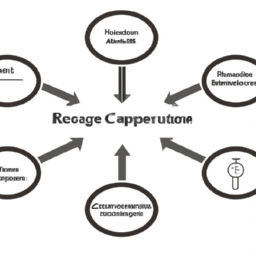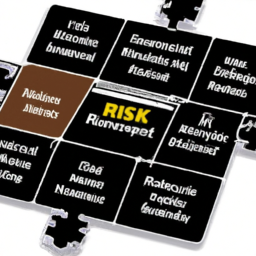Are you ready to take the helm and steer your career towards new horizons?
As a project manager, your success relies heavily on your ability to lead, motivate, and inspire your team to achieve their goals. Just like a captain navigating through treacherous waters, your leadership skills will determine whether your career sails smoothly or encounters rough seas.
In this article, we will explore the profound impact that leadership skills have on a project manager’s career path. We will delve into the essential qualities that make a great leader, such as effective communication, decision-making, and delegation.
Additionally, we will examine how leadership plays a pivotal role in team motivation and productivity, as well as strategic planning and execution. Resource management is another critical aspect that cannot be overlooked, along with the importance of building a strong professional network.
Furthermore, we will discuss the significance of continuous learning and adaptation in a constantly evolving business landscape.
So, join us as we embark on a journey to uncover the transformative power of leadership skills in shaping a project manager’s career trajectory. Together, let’s chart a course towards success and conquer the challenges that lie ahead.
Key Takeaways
- Leadership skills are crucial for project managers to succeed in their careers.
- Effective communication, decision-making, and delegation are essential qualities of a great leader.
- Continuous learning and adaptation are necessary in a constantly evolving business landscape.
- Building a strong professional network provides opportunities for collaboration and career growth.
Essential Leadership Qualities for Project Managers
You’ll need to develop essential leadership qualities like clear communication and the ability to motivate a team, so you can steer your project towards success like a skilled captain guiding a ship through stormy waters.
Effective communication skills are crucial for project managers to convey their vision, expectations, and goals clearly to the team members. This ensures that everyone is on the same page and working towards a common objective.
Additionally, conflict resolution is an essential skill for project managers. As conflicts arise within a team, it’s the project manager’s responsibility to address them promptly and find solutions that satisfy all parties involved. By effectively managing conflicts, project managers can maintain a harmonious and productive work environment.
Transitioning into the subsequent section about the role of leadership in team motivation and productivity, these essential leadership qualities play a significant role in inspiring and driving the team towards achieving project objectives.
The Role of Leadership in Team Motivation and Productivity
Boosting team motivation and productivity relies heavily on an effective leader’s ability to inspire and engage their team members. A leader who fosters a collaborative environment encourages team members to work together towards a common goal. This promotes open communication, idea sharing, and problem-solving, which ultimately leads to increased productivity.
Additionally, an engaged leader understands the importance of employee engagement and actively seeks to create a positive work culture. They recognize the individual strengths and talents of each team member, assigning tasks that align with their skills and interests. This not only boosts employee morale but also enhances productivity as team members feel valued and motivated to contribute their best.
Moving forward, strategic planning and execution play a vital role in a project manager’s career path.
Strategic Planning and Execution
In order to effectively execute strategic planning, it’s essential to set clear goals and objectives. By clearly defining what needs to be achieved, you can provide direction and purpose for your team.
Additionally, developing and implementing action plans will help ensure that the necessary steps are taken to reach these goals.
Lastly, monitoring progress and making adjustments along the way is crucial for staying on track and adapting to any unforeseen challenges or opportunities that may arise. By employing these strategies, you can maximize productivity and achieve success in your project management career.
Setting Clear Goals and Objectives
By setting clear goals and objectives, project managers can effectively guide their teams and drive successful project outcomes. Clear communication is key in this process, ensuring that everyone understands the project’s purpose, scope, and desired outcomes.
By clearly articulating goals and objectives, project managers provide their teams with a roadmap for success, enabling them to align their efforts and work towards a common goal.
Tracking progress is another crucial aspect of setting clear goals and objectives. It allows project managers to assess whether the team is on track and make necessary adjustments if needed. By regularly monitoring and evaluating progress, project managers can identify potential obstacles early on and take proactive measures to overcome them. This ensures that the project stays on schedule and meets its objectives.
In the next section, we’ll explore the importance of developing and implementing action plans to achieve project goals and objectives.
Developing and Implementing Action Plans
Ready to dive into the nitty-gritty of achieving your project goals and objectives? Let’s talk about how you can develop and implement action plans that will set you up for success.
Action plan execution is a critical step in project management. It involves putting your carefully crafted plans into action, ensuring that tasks are completed on time and resources are allocated effectively. As a project manager, it’s important to closely monitor the execution of your action plans to ensure everything is going according to schedule.
Action plan evaluation is equally important, as it allows you to assess the effectiveness of your plans and make any necessary adjustments. By consistently evaluating and adjusting your action plans, you can ensure the smooth progress of your project.
Now, let’s move on to the next section about monitoring progress and making adjustments.
Monitoring Progress and Making Adjustments
Keep an eye on how your project is progressing and make any necessary adjustments along the way to ensure smooth and successful execution. Monitoring progress and making adjustments are crucial aspects of effective project management.
By tracking performance indicators and regularly evaluating the project’s trajectory, you can identify any deviations from the original plan and take corrective actions promptly. This allows you to address potential issues before they become major roadblocks.
Additionally, monitoring progress enables you to assess the effectiveness of your decision-making and leadership skills, providing valuable insights for personal and professional growth.
As you transition into the subsequent section about effective resource management, remember that tracking performance and project evaluation are integral parts of optimizing resource allocation and maximizing project outcomes.
Effective Resource Management
Maximize your team’s potential by effectively managing resources, ensuring that tasks are allocated efficiently and deadlines are met with precision. By coordinating your team’s efforts, you can streamline workflows and eliminate any potential bottlenecks.
This not only improves productivity but also fosters a sense of collaboration and unity among team members. Additionally, effective resource management allows you to control costs and optimize budget allocation. By closely monitoring resource utilization, you can identify areas of improvement and make necessary adjustments to avoid wastage.
Moreover, it enables you to identify and address any skill gaps within your team, ensuring that the right people are assigned to the right tasks. By mastering the art of resource management, you can build a strong professional network by leveraging the expertise and capabilities of your team members to achieve project success.
Building a Strong Professional Network
Connect and collaborate with like-minded professionals in your industry to create a strong professional network that will serve as a springboard for your career aspirations, allowing you to soar to new heights.
Networking opportunities are abundant in today’s interconnected world, providing a platform for relationship building that can significantly impact your project manager career path.
By actively engaging in industry events, conferences, and online communities, you can expand your network and gain access to valuable resources, knowledge, and potential job opportunities.
Building relationships with individuals who share your passion for project management will not only enhance your professional growth but also expose you to diverse perspectives and innovative ideas.
These connections can open doors to mentorship, collaboration, and even future leadership roles.
As you transition into the subsequent section about continuous learning and adaptation, remember that your network will play a crucial role in supporting your ongoing development and success.
Continuous Learning and Adaptation
Embracing a mindset of lifelong learning and adaptability is crucial for staying ahead in today’s ever-evolving professional landscape. As a project manager, it is essential to continuously update your skills and knowledge to effectively lead and manage projects. By investing in learning techniques such as attending industry conferences, taking online courses, and participating in workshops, you can enhance your leadership abilities and stay relevant in your field. Continuous learning not only allows you to acquire new skills but also helps you stay informed about the latest trends and best practices in project management. This knowledge can be applied to improve your project outcomes and enhance your career advancement opportunities. By adapting to new technologies and methodologies, you can demonstrate your ability to navigate complex project challenges and drive successful outcomes.
| Benefits of Continuous Learning | Career Advancement Opportunities | |||
|---|---|---|---|---|
| Acquire new skills | Demonstrate leadership abilities | |||
| Stay informed about trends | Enhance project outcomes | |||
| Adapt to new technologies | Navigate complex challenges | Improve job performance | Increase professional network | |
| Gain recognition | Open doors for promotion | |||
| Broaden job responsibilities | Take on more challenging projects | |||
| Develop expertise in specific areas | Become a subject matter expert | |||
| Increase earning potential | Move up the corporate ladder | |||
| Expand job prospects | Explore new career paths | |||
| Foster personal growth | Build a strong professional reputation | |||
| Collaborate with diverse teams | Lead cross-functional initiatives | |||
| Develop managerial skills | Assume higher-level roles and responsibilities |
Frequently Asked Questions
How does a project manager’s leadership skills impact their overall career growth and advancement opportunities?
Your leadership skills as a project manager have a significant impact on your career growth and advancement opportunities. Effective leadership allows you to inspire and motivate your team, resulting in successful project outcomes.
By demonstrating strong leadership abilities, you gain the trust and respect of your superiors, opening doors for advancement within your organization.
Additionally, your ability to lead and manage projects effectively showcases your potential to take on larger and more complex projects, further enhancing your career growth prospects.
What are some examples of specific leadership qualities that project managers should possess in order to effectively lead their teams?
To effectively lead your teams, specific leadership qualities are crucial. Think of your role as a project manager as the conductor of an orchestra. You need to possess excellent communication skills to ensure everyone is in sync and working towards the same goal.
Additionally, being able to inspire and motivate your team members is key. This will foster a positive work environment and drive productivity. By showcasing these specific leadership qualities, you’ll have a significant impact on your career growth and advancement opportunities.
How does leadership play a role in managing and resolving conflicts within a project team?
Leadership styles are crucial in managing and resolving conflicts within a project team. Effective leaders understand that conflict is inevitable and can arise from differences in opinions, personalities, or goals. By utilizing various leadership styles, such as collaborative or authoritative, project managers can address conflicts and guide their teams towards a resolution.
Conflict resolution skills involve active listening, empathy, and the ability to facilitate open and honest communication. These leadership qualities foster a positive team dynamic and promote successful project outcomes.
Can you provide any tips or strategies for project managers to effectively manage and communicate with stakeholders?
You think you’ve got stakeholder management and effective communication all figured out, huh? Well, here’s a little secret: it’s not as simple as it seems. But fear not, dear project manager, for I shall bestow upon you some valuable tips and strategies.
Firstly, prioritize active listening to understand stakeholder needs.
Secondly, tailor your communication style to each stakeholder’s preferences.
And finally, establish clear and transparent channels for ongoing communication.
Remember, effective stakeholder management is the key to project success.
What are some common challenges that project managers face in terms of resource management, and how can strong leadership skills help overcome these challenges?
When it comes to resource management, project managers often face challenges such as limited resources, conflicting priorities, and changing requirements. However, strong leadership skills can help overcome these obstacles.
Effective communication is crucial in resource management, as it helps project managers understand the needs and limitations of their team members.
Additionally, by strategically delegating tasks and responsibilities, project managers can ensure that resources are utilized efficiently and effectively, leading to successful project outcomes.
Conclusion
In conclusion, leadership skills play a crucial role in the success of a project manager’s career path. By possessing essential qualities such as effective communication, strong decision-making abilities, and the ability to inspire and motivate team members, project managers can drive productivity and ensure project success.
However, some may argue that technical skills are more important than leadership skills. While technical expertise is undoubtedly valuable, it is the combination of technical proficiency and exceptional leadership skills that will truly set a project manager apart in today’s competitive business landscape.
By continuously developing and honing these skills, project managers can navigate complex challenges, build strong professional networks, and adapt to changing environments, ultimately leading to long-term success.















